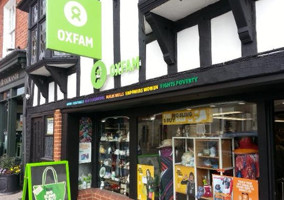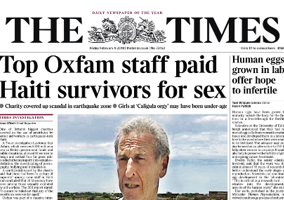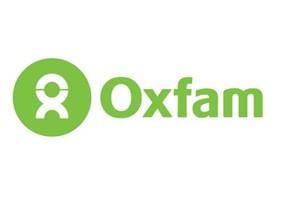Oxfam GB’s culture and safeguarding procedures repeatedly fell below expectations, it missed opportunities to address problems, and was too concerned about its reputation and relationships with donors, according to a highly critical Charity Commission report.
The regulator has today published a 150-page report concluding its statutory inquiry into Oxfam. It has issued Oxfam with an official warning and made a regulatory direction requiring trustees to provide regular updates to the Commission about its ongoing progress.
In a statement, Oxfam said it accepts the Commission's findings but said they were "very uncomfortable".
Lawyers for the charity's former leadership have also issued a statement emphasising that they did take concerns seriously.
The Commisison opened a statutory inquiry - its most serious level of investigation - in February 2018 after the Times newspaper published a number of articles about how Oxfam had handled allegations of sexual misconduct in Haiti a number of years earlier.
In 2011 four members of Oxfam’s staff in Haiti were fired and three, including the country director, resigned in the wake of allegations of bullying and harassment.
Oxfam had filed a serious incident report in 2011, but the Commission said Oxfam withheld key information at the time. It also said the scale and seriousness of the incidents were not made public until the Times was leaked a copy of Oxfam’s internal report last year and reported allegations of sex parties and use of prostitutes by staff.
Last year both the charity and the regulator were criticised by MPs and whisteblowers for their handling of events in 2011.
Launching the inquiry the Commission said it was concerned that Oxfam “may not have fully and frankly disclosed material details about the allegations at the time in 2011, its handling of the incidents since, and the impact that these have both had on public trust and confidence”.
Oxfam’s deputy chief executive, Penny Lawrence, resigned in the immediate aftermath of the scandal and chief executive Mark Goldring handed in his notice later in the year. Danny Sriskandarajah joined Oxfam as chief executive this year and has promised “systematic and cultural changes”.
The Charity Commission has criticised Oxfam for both its handling of events in Haiti and its ongoing approach to safeguarding since then. Its findings have been informed by an independent review being carried out for Oxfam, which shared its findings with the regulator earlier this year.
‘Culture of tolerating poor behaviour’
Helen Stephenson, chief executive of the Commission, said: “What went wrong in Haiti did not happen in isolation. Our inquiry demonstrates that, over a period of years, Oxfam’s internal culture tolerated poor behaviour, and at times lost sight of the values it stands for."
She added that the Commission’s findings highlight the importance of matching good intentions with resources.
“The charity’s new leadership has acknowledged past mistakes and committed publicly to learning the lessons,” she said.
“But significant further cultural and system change is required to address the failings and weaknesses our report identifies.”
Haiti: ‘Missed opportunities’
The Commission’s investigation found that there were “early warnings” and examples of poor conduct among its staff in Haiti that were not adequately addressed.
While Oxfam immediately launched an investigation in 2011 once concerns were raised, the Commission said there were problems with how this was handled, including a leak of sensitive information that could have identified a witness.
The Commission said there was no evidence of a “cover up” but that Oxfam should have been more open.
“The impression the inquiry has is that Oxfam GB’s handling of these matters was influenced by a desire to protect Oxfam GB’s reputation, and to protect donor and stakeholder relationships,” it says.
Actions did not match its promises
The regulator said that when it looked at the wider issue of safeguarding in Oxfam it found “systemic weaknesses”.
It said this was largely down to the charity not adequately resourcing its safeguarding function.
The Commission said that Oxfam’s safeguarding team was overstretched and unable to carry out much preventative work. It says it engaged with Oxfam about this between 2015 and 2017 but the charity did not meet promises to increase resources for safeguarding.
Oxfam has since made a significant investment in its safeguarding team and provided training across the organisation.
An independent HR review, carried out for Oxfam in 2017, highlighted weaknesses and made 40 recommendations to strengthen the culture, 35 of which are in the process of being taken forward. Oxfam told the Commission it has completed 28 of these recommendations.
Charity shops
The Commission has told Oxfam to address weaknesses in its charity shops’ audit processes.
It has seen findings from an independent review, which reveal that 80 per cent of safeguarding allegations and incidents involve volunteers, but nearly 10 per cent of shops audited did not have required documents and risk assessments in place.
Official warning
Oxfam has been given an official warning which will stay on its corporate record and be listed with its entry on the register of charities.
The Commission said this reflects the serious nature of mismanagement prior to 2018 and the collective corporate failure by its leadership.
The warning says that by repeatedly failing to improve resourcing of safeguarding between 2015 and 2017, the charity was exposed to “undue risk”.
No current or former trustees have been banned.
Timeline of regulatory engagement
2011: Oxfam makes a serious incident report to the Charity Commission about Haiti but does not give full details
November 2017: After reports in the Times the Commission contacts Oxfam
December 2017: The Commission tells Oxfam to improve its safeguarding and governance arrangements
February 2018: The Commission opens a statutory inquiry
June 2019: The Commission publishes its findings
Oxfam’s chief executives
Dame Barbara Stocking 2001 - 2013
Mark Goldring 2013 - 2018
Danny Sriskandarajah 2019 - present
Oxfam: ‘We will change working culture’
Caroline Thomson, Oxfam’s chair, said: “What happened in Haiti was shameful and we are deeply sorry. It was a terrible abuse of power, and an affront to the values that Oxfam holds dear.
“The Commission’s findings are very uncomfortable for Oxfam GB but we accept them. We now know that the 2011 investigation and reporting of what happened in Haiti was flawed; more should have been done to establish whether minors were involved.
“The decision to allow the country director to resign without a fuller investigation of his own conduct would not be permitted today, under our current policies and practices. And while the Commission makes clear that it found no record of a ‘cover-up’, we accept that Oxfam GB should have been fuller and franker in its initial reporting of the allegations.
“We should have acted more decisively to address resourcing concerns raised by our own safeguarding team, and been more proactive in our reporting of serious incidents. But I am confident that Oxfam GB is changing, and that the steps we are taking are putting Oxfam on the right path for the future.
“Both the Charity Commission and the independent review of our safeguarding record since 2011 acknowledge the progress Oxfam GB has made over the past year. The review recognises our appetite to improve – citing better referencing and incident reporting, and improved casework, especially in Oxfam shops, as evidence of a sharper focus.”
“Over the coming weeks, we will study the Commission’s full report and put together a broader plan to further strengthen our approach to safeguarding, in light of both the regulator’s findings and the forthcoming report by the Independent Commission on Sexual Misconduct, Accountability and Culture Change.
“Our first concern is for the security and safety of those we serve. We acknowledge and admire the courage of survivors, and ask anyone who has experienced or witnessed abuse to come forward. Where there is evidence of wrongdoing, we will take the firmest of action, including by reporting allegations to the relevant authorities where that is appropriate.”
“As the Commission rightly says, meaningful change requires more than a checklist of policies and procedures. Oxfam will act to change its broader working culture, so that how we work is considered as important as what we do, and we will ensure that improvements are embedded at all levels of the organisation. We recently appointed a new chief executive, Dr Dhananjayan Sriskandarajah, to lead this change. His pledge, and that of all the trustees, is to ensure that Oxfam GB can never again be fairly accused of putting reputation above accountability.”
Danny Sriskandarajah, Oxfam GB chief executive, said: “From war zones to natural disasters, from famine to epidemics, Oxfam operates in some of the most difficult environments on Earth – environments which always carry safeguarding risks. The true test for us is what Oxfam does to minimise these risks, and how we respond to incidents when they arise.
“As the incoming chief executive, my first duty has been to ensure that Oxfam learns the lessons of the past, and improves our policies and practice. Oxfam has a long and proud history of helping to save lives and alleviate poverty around the world, but we know this vital work relies on the respect and trust of supporters and all those Oxfam serves.”
Oxfam’s former leaders: ‘Our actions were insufficient’
Former leaders of Oxfam issued a statement through a law firm. These include the chair until October 2011; the chair between October 2011-October 2017; the CEO until February 2013 (Dame Barbara Stocking); the CEO from April 2013 to January 2019 (Mark Goldring); and the director of programmes in 2011.
The statement, by Alison Talbot, partner & head of national charities at Winckworth Sherwood, on behalf of former Oxfam GB trustees and senior executives, said: “The Charity Commission report has highlighted the seriousness and complexity of safeguarding issues facing Oxfam and other charities working in the aid sector.
"We hope that its findings will contribute to ongoing improvements in how Oxfam and the sector carry out their vital work to prevent abuse of staff, members of communities and beneficiaries.
“As trustees and senior executives, those of us then in office were appalled when in 2011 we found out about the behaviour of some of Oxfam’s staff posted to Haiti. At the time, Oxfam was delivering water to half a million people in Haiti. These members of staff let Oxfam, and our beneficiaries, down badly. We apologise to all those affected.
“In 2011, we acted immediately to ensure all of the allegations were urgently investigated by sending out an investigation team. The individuals suspected of breaching Oxfam’s code of conduct were suspended. Four employees were subsequently dismissed once the investigation was concluded, and this was publicised by Oxfam at the time.
“We recognise that the Charity Commission has identified weaknesses in the handling of the events in Haiti. We implemented a detailed action plan to address the wider issues identified by the investigation both in Haiti, and across our international programmes. As trustees and senior executives at the time, we were determined to tackle sexual exploitation and abuse, and we established a number of programmes and initiatives to prevent and identify safeguarding issues.
“Safeguarding is and remains a huge issue for all charities, and the Commission has pointed out the need for greater resource, more rigorous investigatory procedures, and senior oversight and accountability. We recognise today that our efforts in 2011 and subsequently were insufficient, especially in the light of all of the information available to the Charity Commission in the course of this statutory inquiry.
“Safeguarding is fundamental to what Oxfam and other humanitarian agencies have to do. Those caught up in humanitarian disasters must trust the agencies which are there to help them, upon whom their lives may depend. They should be kept safe from all and any abuses.”
|
Related articles












